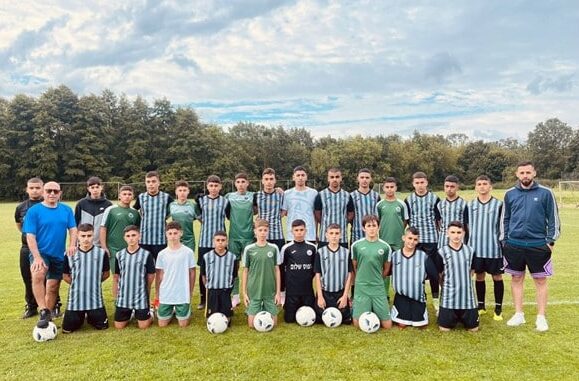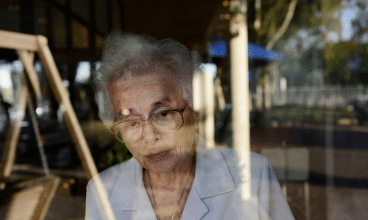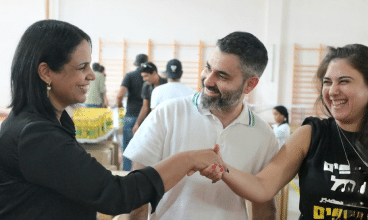Emergency Relief and Empowerment of Russian-Speaking communities – Sasha from Tzedek Centers in Interview
In early November, Sasha Mijeritsky, Director of the Department for Russian-Speaking Communities in Israel at Tzedek Centers, visited the Berlin office of the Foundation “Remembrance, Responsibility and Future” (EVZ). In an in-depth interview with Maja Sojref, Project Lead for the Israel Network, he spoke about the organization’s work in the immediate aftermath of October 7, 2023, and how things have changed since then.
Tzedek Centers is an Israeli non-governmental organization that aims to empower Israel’s citizens to engage in their local communities and bring about positive change.
Following the terrorist attacks, Tzedek Centers responded quickly, providing support to internally displaced people and survivors of the violence particularly in communities in southern Israel that were under attack, such as Sderot, Ofakim, and Netivot. Among other initiatives, they set up a multilingual hot-line for evacuees seeking assistance with a wide range of needs. Sasha’s team focused especially on supporting Russian-speaking Israelis who required additional help. Beyond immediate relief, Sasha is committed to empowering immigrants from Ukraine and Russia to actively participate in Israeli society and advocate for their rights in the long term.
The Israel Network is raising funds for Tzedek Centers to continue supporting communities affected by the attacks, more than a year after October 7, 2023.
What is the mission of Tzedek Centers?
How do you support Russian-speaking immigrants?
Tzedek Centers aim to enable civic engagement among Israeli citizens and thereby strengthen democratic coexistence. They offer networking events, courses, and counseling for people who want to improve their local communities. “At the regional level, citizens can make a difference,” says Sasha. This brings the concepts of democratic participation alive.
As the Director of the Department for Russian-Speaking Communities, Sasha is primarily responsible for supporting new immigrants from Ukraine and Russia. Many of the 200,000 people who have arrived in Israel in recent years are young, well-educated, and hold liberal-democratic values. They want to feel at home in Israel and become actively involved in society. Supporting them in this process is exactly what Sasha aims to do.
How did the Tzedek Centers support citizens after the terrorist attacks of 7th of October 2023?
On October 7, 2023, Hamas terrorists and other armed groups crossed into the southern Israeli city of Sderot from the Gaza Strip and murdered 50 civilians. The fighting continued until October 10. Most residents of Sderot were evacuated, but not all, as Sasha and his team soon discovered. Around 5,000 people—mostly elderly, Russian-speaking residents—had remained, unknown to the authorities, while supermarkets and pharmacies were closed and rocket fire continued. Together with volunteers, Sasha traveled to Sderot to provide these individuals with basic necessities and to let them know they were not alone. Later, he organized gatherings for holidays such as Hanukkah, the Jewish Festival of Lights, to bring joy and restore a sense of community.
For Sasha it is important to provide long-term support for the attacked communities in southern and northern Israel and to empower the residents. Therefore, Tzedek Centers offers training courses for civic engagement and aims to connect local leaders of various social initiatives. Many people immigrating from Ukraine and Russia get involved in social initiatives or contribute to the art scene shortly after their arrival in Israel. Tzedek Centers supports these people in navigating Israeli bureaucracy, building their own initiatives, and creating a network of dedicated people. In the end, Sasha says, not only the russian-speaking Israelis will benefit, but the entire Israeli society.
Where you can provide support


